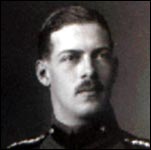 |
 |
 |
 |
 |
 |
 |
 |


 |

   |
 |
 |
 |
 |
 |
 |
 |
Alexander was the second son of King Constantine I and Queen Sophie. He was born in August, 1893. He succeeded his father in June, 1917. King Constantine I had been forced to leave the throne because of pressure from France and the Entente Powers fighting Germany in the First World War. He was thought to be too pro-German. He refused to abdicate, but accepted that he should be replaced by his second son Alexander. Alexander was preferred as a successor to his elder brother, the Crown Prince George - who was also thought to be too pro-German. Alexander was quickly 'a prisoner in his own palace', said his youngest Uncle, Prince Christopher (the youngest of King George I's 8 children): 'only the enemies of his father and the Royal House were permitted to be in his service'. Greece was, effectively, in the hands of its Prime Minister, Venizelos. Alexander's main interests were motor cars and pet animals. King Constantine I said that Alexander should regard the throne as a trust which he held during the absence of his father and elder brother.
King Constantine I went into exile in Switzerland. He left from the Bay of Oropos near Tatoi. Fisherman knelt and wept as he and his family (except Alexander) departed for Sicily on the first leg of their journey to Switzerland.
Soon after Alexander's short reign began, Greece formally declared war on Germany, Austria-Hungary, Turkey and Bulgaria (in July 1917). In May, 1918, the Greeks helped the French and British in their conflict with Bulgaria in Macedonia. Alexander was popular with British staff officers. General Milne gave him a pet Alsatian dog captured from the enemy, called 'Fritz'.
Greek participation in the later years of the Great War underpinned the territorial claims which the Prime Minister, Venizelos, put forward vigorously at the Paris Peace Conference. He argued persuasively in favour of northern Epirus and eastern Thrace, the international control of Constantinople, and the acquisition of Smyrna and its hinterland. For Greece, conflict continued after 1918. Greek troops landed at Smyrna on 15 May, 1919.
On 4 November 1919, Alexander married Aspasia Manos daughter of Colonel Petros Manos, an equerry of the exiled monarch, Alexander's father, King Constantine I. Aspasia never took the title of Queen.
King Alexander I was in eastern Thrace in July,1920 when his troops occupied Adrianople - but he did not cross to Asia Minor, where Greek troops defeated Turkish nationalist opposition, occupied Brussa and reached the Sea of Marmora.
In the second week of October, 1920, Venizelos sought British support for a Greek offensive against the Turkish General Mustafa Kemal's base at Ankara - as the next step to realising a Hellenic kingdom straddling the Aegean - the Great Idea.
As the military politics of the post World War period clanked on in the Balkans, tragedy struck the Greek Royal Family. On 27 September, King Alexander, after repairing the engine of his car at Tatoi, was involved in a bizarre accident. His dog, Fritz, was involved in a fight with 2 pet monkeys (owned by the Manager of the estate). The King tried to separate them and was bitten on the leg by one of the monkeys. The wound turned septic and, after 4 weeks and 7 operations, the young King Alexander I died on 25 October 1920. He was 27. He left his wife, Princess Aspasia. She gave birth to their child, Alexandra on 25 March 1921.
The throne passed to Queen Olga, King Alexander's grandmother, as Regent. Venizelos fell after his major election defeat on 14 November and left the country. A plebiscite on 5 December resulted in a massive majority calling for the restoration of King Constantine I. Alexander's father returned to great acclaim a fortnight later.
View more profiles of the Greek Monarchy...
Click here to view the family tree...
|
 |
 |
|
 |
